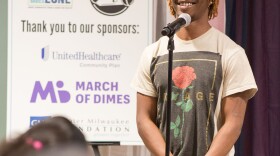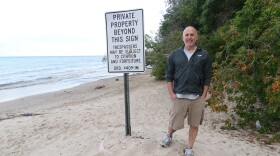Updated Jan. 21 at 11:06 a.m.
Racial justice issues remain front and center in 2021.
A few days after the start of the new year, the Kenosha County district attorney announced that the officer who shot Jacob Blake in the back won’t face charges.
The following day, a huge crowd of mostly white rioters stormed the nation’s Capitol building, in an attempt to stop the certification of electoral college votes. They forced lawmakers to run for cover. Five people died as a result of the siege.
Many people noted what appeared to be a light police presence at the Capitol — especially compared to the presence at Black Lives Matter protests.
Andro Jacobs is an activist who lives in Kenosha. He was there the night before the district attorney announced a charging decision in Jacob Blake’s shooting. Jacobs says there was a heavy police and National Guard presence in Kenosha the night before the announcement. He contrasts it with the security that appears to have been in place at the U.S. Capitol Jan. 6.
“I'm watching them set up barricades and me not be able to drive in certain parts of the city that I live in, meanwhile warnings are not being heeded in our own capitol, and there's no barricades, and they let these people go through, but they barricaded us from certain portions of our own city, because they were afraid of a decision that they knew where they were going to hand down the next day,” he says.
Jacobs points to the select Capitol Police who allowed rioters to storm the capitol or took selfies with them. At least two officers have been suspended and others are under investigation.
“They were also helping them out down the stairs when they were being escorted out. They were letting them ransack this place. So if we ever need a glaring example of systemic racism there it is, a glaring example of hypocrisy. There it is,” he says.
But Jacobs says he’s not sure that people are listening.

While marchers from diverse backgrounds joined the George Floyd, Breonna Taylor and Jacob Blake protests last summer, Jacobs says he saw apathy and complacency, including among some of his white friends.
He says some just sort of said “oh, it’s happening and it’s here?”
“And it's like, well, dude, yeah, it's happening, it's here. Do you want to be on the street about it and be vocal about it? You as a one of my white friends who like has thousands of followers on whatever social media platform? I know, you don't feel like this is your battle, but it certainly is mine,” he says.
Jacobs says there also were people in the Kenosha community who were vehemently opposed to demonstrations for social justice or against police brutality.
“You know, there's the MAGA dudes and there's the Blue Lives Matter, guys and girls," he says. "It definitely showed like, I live in a community where there's people who certainly don't care about me at all."
'It definitely showed like, I live in a community where like, there's people who certainly don't care about me at all.'
Jacobs says the Kenosha County district attorney’s decision not to charge Officer Rusten Sheskey in Jacob Blake’s shooting was disappointing, but not surprising. The DA determined that Sheskey had a valid self-defense claim that would prevent the DA from prevailing at trial.
But Jacobs says if officers were charged in such cases, that would encourage accountability.
“It would take things more in the direction of police having more responsibility over the lives they take. It would force them to be more responsible, if he did get charged. And we don't live in a state where they necessarily care about that,” he says.
Jacobs says this month’s events, including the historic insurrection at the Capitol, are the latest, most visible examples of systemic racism.
“What I'd like people to take away from this is that, like, you hear us talk about systemic racism so much, you hear that word so much, but now, like I said, you can see it. And this isn't the only form. The guy that does my car insurance, if he likes me, and because he thinks I'm white, like, guess what, I'm getting a better rate, the dude who does a loan application for credit or something, or this or that, those guys, guess what? They're fallible people also, and they happen to be white sometimes,” he says.
Jacobs wants people to see the systemic racism in recent events, but also to realize that the problem is everywhere.
Mariah Smith is with the People’s Revolution in Milwaukee, a local group that’s demanding accountability and justice in policing. She says these are only the latest incidents that show how white supremacy is embedded into this country.
Mariah Smith wears multiple hats — she works with kids with special needs at a local elementary school, she’s a mentor, a drummer and also an activist for Black rights.
She got involved in protesting after seeing the video of what happened to George Floyd.
“It put a fire in me that I'd never felt a day in my life. I'd never felt that feeling. And it was a feeling of rage. Honestly, I'm shocked beyond shocked. So that's, that. I’m scrolling on Facebook and I see a couple days later, it's a protest. So I'm OK, I honestly had never done a protest before. So I'm like, this seems like a time where I should … jump in,” says Smith.

Smith notes activists in Milwaukee have organized continuous protests and have been marching since May 29, 2020 — more than 230 consecutive days. But those protests have garnered police response.
“So literally going through Tosa and these are just even normal nights where we're driving up by Mayor McBride's house. And our biker he gets snatched off the bike, they throw him on the ground. They're not letting us go through. They have tear gas, they call for different police from Fox Point, Brookfield, Dela — just so many different places. I think it was probably five or six different police counties there that came to keep us calm or keep us from marching which way that we wanted to go, from exercising our right to protest,” she says.
Smith contrasts the protests in Milwaukee and Kenosha with how Capitol police handled the rioters in Washington, D.C. with restraint.
“With us that's never ever, ever an option. Andre Hill was just killed … in his garage, shot in his garage. One hand had his phone, his other hand is in his pocket with keys and he was shot in his garage. They fear for their life from seeing us. So these people tote guns, they're yelling all type of just different, just crazy things, and they can storm the Capitol until they get out. That's when they're met with tear gas,” she says.
And when it comes to the failure to charge Kenosha Officer Rusten Sheskey for the shooting of Jacob Blake, Smith says when police officers aren’t brought to justice, the message is society doesn’t care about Black people.
“It's a constant. It's a reoccurring story. Alvin Cole, Jay Anderson, Antonio Gonzalez, Joel Acevedo — these are names that we need to consistently say because … three of those already don't have justice. They've been found not guilty. Joseph Mensah has been found not guilty for killing them, for murdering them, for executing them. Here comes Joel Acevedo, he was choked out in his home, at a party by Michael Mattioli. And this guy's out free. Kyle Rittenhouse is out having a beer with his mom yesterday, at Pudgy’s in Kenosha, so that's what Pudgy’s stands for. That’s what this country stands for. At least 50% of this country. They feel that Jacob Blake should have been shot walking away to his car,” she says.
Smith says this is why they still march and why they still fight.
Ajamou Butler is an activist and founder of Heal the Hood Milwaukee. He joined protests for racial justice last year and described the force that he and other protestors were confronted with from police.
“They met us with so much tear gas,” Butler says. “I may have been three to four blocks back from where the police were at but we could smell the tear gas.”
He also describes fellow protestors who had their car wheels destroyed with spike stripes laid by police or shot with rubber bullets in the face and chest.

That is why Butler was frustrated as he watched scenes of rioters storm the U.S. Capitol and says this is an explicit example of the lack of respect for Black lives in America.
“We are in a country right now that does not value Black lives. It just is what it is. So that’s why we chant ‘Black Lives Matter’,” he says.
His work with Heal the Hood Milwaukee is to help the next generation work through racial trauma.
“I’m looking at a Black child who spends the majority of their time watching TV or on social media seeing people of color gunned down, how we just said, for less than, significantly less than storming the Capitol,” he says. “Now I’m thinking of the trauma that, that child of color is going through, the fear that, that child is going through.”
It’s not just policing that Butler is worried about but the disparity in outcomes in the criminal justice system as a whole. While he says he isn’t surprised by the decision made in Kenosha not to charge the officer who shot Jacob Blake, it is his hope that one day officers involved in violent acts face some consequences.
“That would mean a lot to me, it would mean that I could have some sort of potential, maybe, chance that if I get gunned down by a police officer, you know, justice will be served,” says Butler.






